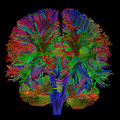Flowers are beautiful and fragrant. Just seeing and/or smelling them has a powerful effect on your brain. This effect is magnified when you view them in their natural setting (blooming wild on a grassy hill), as opposed to poking out from a pretty vase on your grandmother’s piano. Researchers have reported that pleasant aromas may decrease anxiety and help form more vivid memories.
Flowers may affect your brain by changing the level of neurotransmitters (chemicals that provide communication between brain cells (neurons)):
Dopamine may be increased. Dopamine is the primary neurotransmitter involved in the brain's reward system. When you engage in behavior the brain perceives as pleasurable, dopamine is released and you feel motivated and rewarded.
Oxytocin may be increased. Oxytocin is a hormone that affects the body (breastfeeding and childbirth) and is also a neurotransmitter that affects the brain. Research has found that a puff of oxytocin into the noses of volunteers directly affected brain cells and increased feelings of trust, empathy and social cooperation.
Serotonin may be increased. While dopamine may be considered the quintessential reward neurotransmitter, serotonin is a soothing neurotransmitter that allows you to keep an even keel. It helps you maintain a balanced mood, sleep/wake cycles and a healthy appetite.
Certain flowers merit their own shout out:
Crocus flowers are one of the harbingers of spring, sometimes even fighting through a blanket of snow to make their debut. Saffron can be extracted from the filaments that grow inside Crocus sativus. Scientists have reported that supplementing the diet with saffron may provide several brain benefits: Increase blood flow to the brain to minimize the effects of stroke, improve mood and help fight depression.
Lavender may also provide unique benefits to your brain. Scientists have reported that its fragrance may improve quality of sleep, reduce depression, reduce anxiety and increase sexual desire.
Aromatherapy, with Lavender essential oil has been the focus of clinical studies for the alleviation of depressive symptoms. A group of scientists studied the brains of laboratory rats to determine the possible mechanism of action. The researchers reported that lavender improved the depressed and anxious behavior in the rats. It also enhanced the brain structure of the animals with improved connection (synapse/dendrite neuroplasticity) between the cells (neurons) and increased production of new neurons (neurogenesis). It also increased the level of oxytocin (known as the "cuddle hormone" or the "love hormone," because it is released when people snuggle or bond socially) and BDNF ((brain derived neurotrophic factor) a protein essential in allowing neurons to thrive, grow and mature) in the rats’ brains.
Another group of researchers studied lavender aromatherapy in menopausal and post-menopausal women. They reported that the vast majority of women involved reported feelings of relaxation, happiness and physical well being.
Tea made from Hibiscus flowers has been enjoyed for at least a thousand years and has long been believed to provide health benefits. Modern day science has suggested that hibiscus may help fight memory stealing dementias such as Alzheimer’s disease. Extracts of the flower have been reported to decrease neuroinflammation. Studies on experimental mice have shown that hibiscus may fight dysfunction of proteins (tau and caspase-3), which may contribute to poisoning of brain cells (neurons).
In 2022, Korean researchers tested the tea extract Gossypetin in mice. The scientists discovered that the benefit of hibiscus was most pronounced in the microglia (an immune cell that resides in the brain). The scientists proved that, in mice whose diet was supplemented by Gossypetin, the microglia rushed around the brain and ate up the plaques (abnormal congregations of proteins) which would otherwise accumulate In Alzheimer’s brains. What’s more, certain mice treated with Gossypetin benefited from improved maze running abilities.
If you’d like to learn more about aromatherapy, please read https://brain2mind.substack.com/p/hey-whats-that-i-smell
If you’d like to learn more about the benefits of tea, please read https://brain2mind.substack.com/p/whats-better-for-your-brain-coffee




That is incredible, thanks for sharing this.
Fascinating. Loved this one, Marc.